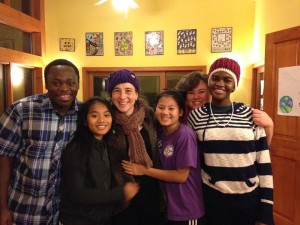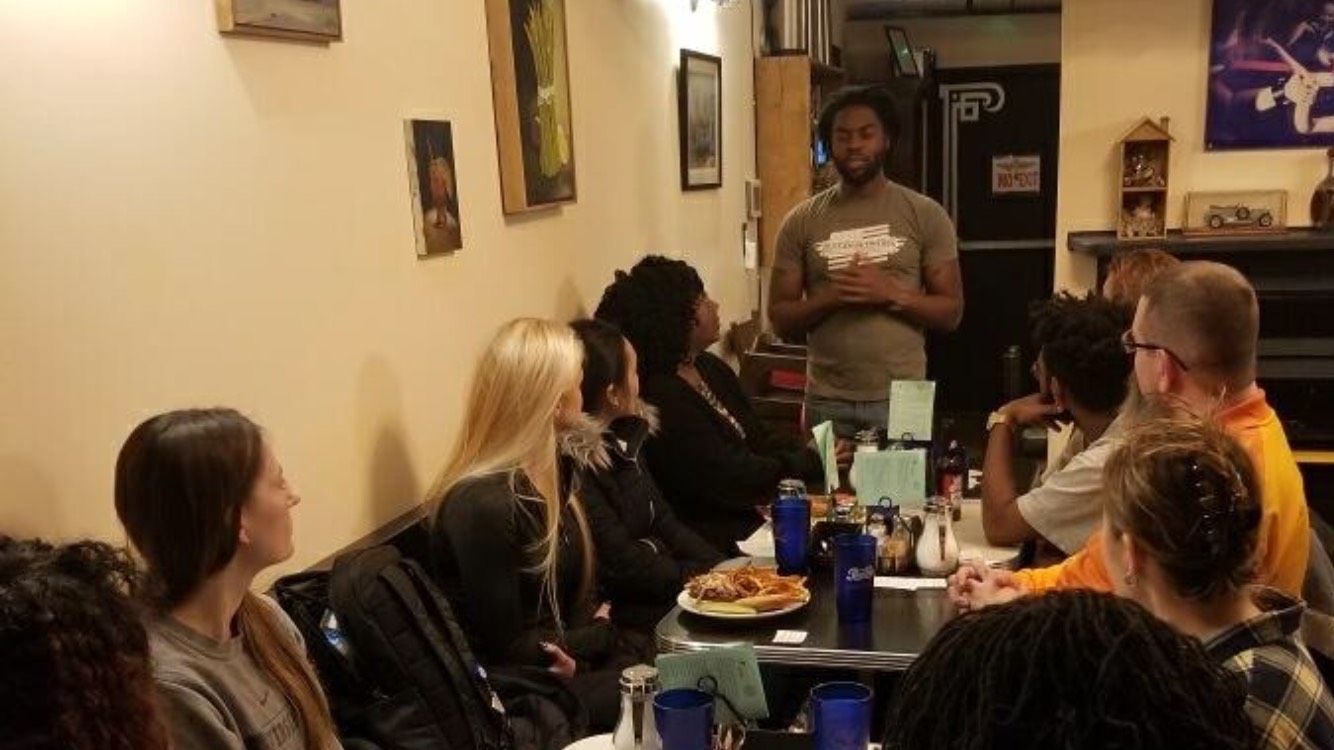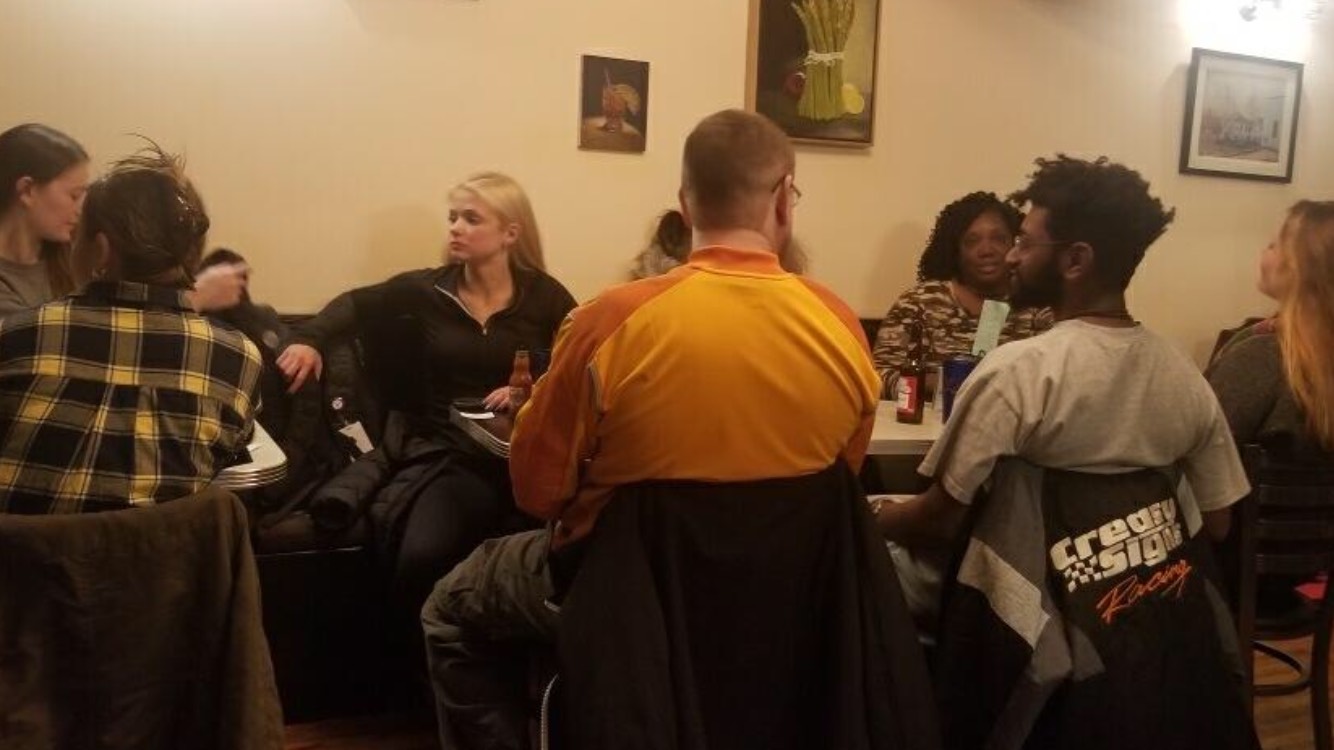I began an experiment about 6 months ago. I decided that I wanted to work with young people. I decided that I wanted to do it in ways that felt genuine to me. I decided that I wanted to interact with the young people as a mentor, friend, and unabashedly myself.
I surrounded myself with friends who share similar values and who are also creating the world they want to exist in. We are working to create an inclusive and supportive community for our young members. We made some mistakes, but mostly it’s been joyous and fun. It doesn’t fit into our normal non-profit paradigm. Thankfully.
Scroll down to read quotes from students, see some raw data, and some lessons learned.








Comments from BE Youth Members
Community dinners are special to me because I get to meet new people, learn about their jobs and what they do. It’s fun and you learn about other people and you get to know them.
–H.P. CHS Junior
You were helpful because you were keeping us on track and you were there to help us go through personal and school related problems… you actually directed some of us to go talk to our professors and advisors…and you never ever for once give up on any of us…some of the time when we push other people away they will stop coming but you were always there.
–F.O. PVCC student
Ms. Dolly spent her whole morning helping me edit my research paper that was due within couple of hours. I hate to admit it, but I usually do my work last minute. I hadn’t started on my research paper that was assigned on the first day of classes, until few hours before it was due. I got a B though. I don’t think I can ever forget the all-nighters I spent fretting, and how with the help of Ms. Dolly I got a B. We were not expecting that at all, but we were both happy.
–D.U. GMU student
Being a part of BE gives me the chance to help others understand that being a mother is not the end of the road.
–M.H. Certified Nurse Associate, and Pharmacy Tech
Having someone to give you honest advice about college and other things really makes a big difference. I’m blessed to have so many wonderful people like you in my life who I can turn to, ask advice about certain things and can be sure that I’m getting a honest answer.
–M.A. VCU student
You put smile in my face, make me think about my future. Ask me what’s going to be next step, every Monday and it feel neat to be asked. I am thankful for that.
–B.O. PVCC student
You were a means of support for me personally and academically. You are always there showing me the way and the steps I need to take to get there. I know I can come to you for help regarding anything, and I appreciate that you are always there to help and listen.
–G.N. PVCC student
Summary of Services
Building Experiences has worked with 35 students this fall. All services are free to students, and to date; all work has been done on a volunteer basis. Our income has been $1705 cash donations, and about $785 in in-kind donations. Expenditures have equaled $1,440.53. Please donate to support our work.
- We have shared meals with 68 community members, including 26 youth members in the months of December and January.
- BE held 10 check in sessions at PVCC and reached 23 students, including a core group of 11 students who sought BE out each week. Topics of discussion included transferring to 4 year schools, dealing with financial aid, improving relationships with parents, peers and professors, and how to balance school and work.
- BE has provided help to 10 students with editing papers, college essays, resumes and/or cover letters, sometimes even at the last minute.
- BE has hosted 5 special events since August. We’ve enjoyed EpiCroqueTournament, a long distance, mixed terrain croquet game, held a “Tool Day” where we built birdhouses and carved in stone with a dremel tool, constructed natural wreaths, and attended a multi-day Youth Conference featuring bookbinding, knitting, car-care, college prep and a falcon(!). We celebrated the MLK Jr. weekend by having a delightful walking tour of local, downtown businesses. 17 students have participated in these special programs.
Lessons Learned/Guiding Principles
This has been a glorious experiment, with no end in sight.
- Reject the “rules” I’ve been instructed in my professional life to establish boundaries, keep my distance, be equitable and fair. And yes, in many ways these are sensible, protective measures. But they are so limiting. There are young people who need hugs, young people who need money, young people who need rides, young people who need to be told what is up. I think many of the rules put into our institutions are based upon fear. I reject that fear.
- Play the long game Fiscal and academic years lull us into measuring progress with met outcomes and completed classes, but ultimately we’re raising people. People who need to know their stories, understand their strengths, and have a network of supporters. Sometimes there are issues that can’t be resolved in one month, one semester, or one year. There are so many people that we can gain inspiration from who kept persevering. We must give ourselves permission to slow the pace of our aspirations, and honor those who work towards goals years in the making.
- Don’t let shiny gadgets distract you from the true magic I wanted to be famous. I wanted to be an old school professor. I wanted to be an avant garde artiste type with shaped hair. I wanted to be a thought leader. What I love to be now is a connector of people, someone who helps dreams come true, people become their best selves. Occasionally I get offers or suggestions that divert me from that passion. Fame, prestige flickers enticingly. And then I remember that that is false promise, and what makes me happiest is knowing that I made one of these young people see and realize their potential. Finally I have found the focus that eluded this jack of all trades for so many decades.
Thank you to BE’s Partners, Volunteers, Donors
Blue Moon Diner
Frazier Family Foundation
The Local Restaurant
Virginia Organizing
Gibson’s Grocery
Camp Holiday Trails
Whole Foods
Denise Interchangeable Knitting and Crochet
Peggy Harrison
Sammy Kaplan
Vu Nguyen
EcoVillage Charlottesville
Mudhouse
Hedge
Cha Cha’s
Frozen Motion Glass
Taiwan Garden
Join our over 50 individual donors, volunteers, and supporters, Give Today.
Building Experiences Steering Committee is
Laura Galgano, Ellen Krag, Mia Logan, Davina Fournier and Marissa Turner-Harris.
Dolly Joseph is the Chief Facilitator.


















